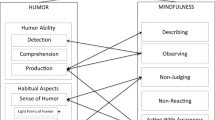Abstract
Positive psychology is a scientific approach within psychology that focuses on research on what is best in people. Within this framework, humor is understood as a character strength. The article gives a brief overview on positive psychology and implications for aging (positive aging, successful aging) with an emphasis on the contribution of humor. Humor as a strength of character and its measurement by various approaches are discussed. It is argued that there is a lack of empirical data about humor in the elderly. Potential benefits of considering humor in research but also in practice are discussed.
Zusammenfassung
Positive Psychologie ist ein wissenschaftlicher Ansatz innerhalb der Psychologie, der sich in der Forschung damit beschäftigt, was das Beste im Menschen ist. In dieser Forschungsrichtung wird Humor als Charakterstärke verstanden. Der vorliegende Artikel gibt einen kurzen Überblick über die Positive Psychologie und Implikationen, die sich für das Altern (positives, erfolgreiches Altern) ergeben. Dabei wird das Hauptaugenmerk auf den Beitrag gelegt, den Humor leisten kann. Humor als Charakterstärke und Möglichkeiten der Messung werden diskutiert und im Überblick, gemeinsam mit anderen Ansätzen zur Messung von Humor, vorgestellt. Es wird argumentiert, dass es zum Humor älterer Menschen zu wenige empirische Daten gibt. Weitere Diskussionspunkte sind mögliche positive Auswirkungen für Forschung und Praxis.
Similar content being viewed by others
References
Beermann U, Ruch W (2009) How virtuous is humor? What we can learn from current instruments. J Posit Psychol 4:528–539
Carstensen LL, Charles ST (2003) Human aging: why is even good news taken as bad? In: Aspinwall LG, Staudinger UM (eds) A psychology of human strengths: fundamental questions and future directions for a positive psychology. APA, Washington DC, pp 75–86
Chapman AJ, Foot HC (eds) (1977) It’s a funny thing, humour. Pergamon Press, Oxford
Craik KH, Lampert MD, Nelson AJ (1996) Sense of humor and styles of everyday humorous conduct. Humor 9:273–302
Fernandez-Ballesteros R (2003) Light and dark in the psychology of human strengths: the example of psychogerontology. In: Aspinwall LG, Staudinger UM (eds) A psychology of human strengths: fundamental questions and future directions for a positive psychology. APA, Washington/DC, pp 131–147
Goldstein JH, McGhee PE (1972) The psychology of humor: theoretical perspectives and empirical issues. Academic Press, New York
Hirsch R, Bruder J, Radebold H (eds) (2001) Heiterkeit und Humor im Alter. Kassel: Schriftenreihe der Deutschen Gesellschaft für Gerontopsychiatrie und -psychotherapie, Band 2. Chudeck-Druck, Bornheim-Sechtem
Köhler G, Ruch W (1996) Sources of variance in current sense of humor inventories: how much substance, how much method variance? Humor 9:363–397
Martin RA (2007) The psychology of humor: an integrative approach. Elsevier Academic Press, Burlington, MA
Martin RA, Puhlik-Doris P, Larsen G et al (2003) Individual differences in uses of humor and their relation to psychological well-being: development of the Humor Styles Questionnaire. J Res Pers 37:48–75
McGhee PE, Goldstein JH (eds) (1983) Handbook of humor research, vol 1 & 2. Springer, New York
McGhee PE, Ruch W, Hehl FJ (1990) A personality-based model of humor development during adulthood. Humor 3:119–146
Nahemov L, McCluskey-Fawcett KA, McGhee PE (eds) (1986) Humor and aging. Academic Press, New York
Park N, Peterson C (2006) Moral competence and character strengths among adolescents: the development and validation of the Values in Action Inventory of Strengths for Youth. J Adolesc 29:891–910
Park N, Peterson C, Seligman MEP (2004) Strengths of character and well-being. J Soc Clin Psychol 23:603–619
Peterson C (2006) A primer in positive psychology. Oxford University Press, New York
Peterson C, Park N, Seligman MEP (2005) Assessment of character strengths. In: Koocher GP, Norcross JC, Hill III SS (eds) Psychologists’ desk reference, 2nd edn. Oxford University Press, New York, pp 93–98
Peterson C, Park N, Seligman MEP (2005) Orientations to happiness and life satisfaction: the full life versus the empty life. J Happiness Stud 6:25–41
Peterson C, Ruch W, Beermann U et al (2007) Strengths of character, orientation to happiness, and life satisfaction. J Posit Psychol 2:149–156
Peterson C, Seligman MEP (2004) Character strengths and virtues: a handbook and classification. APA, Washington, DC
Rowe JW, Kahn RL (1987) Human aging: usual and successful. Science 237:143–149
Ruch W (2004) Humor. In: Peterson C, Seligman MEP (eds) Character strengths and virtues: a handbook and classification. APA, Washington, DC, pp 583–598
Ruch W (ed) (2007) The sense of humor: explorations of a personality characteristic, Mouton de Gruyter, Berlin
Ruch W (2008) The psychology of humor. In: Raskin V (ed) A primer of humor. Mouton de Gruyter, Berlin, pp 17–100
Ruch W, Carrell A (1998) Trait cheerfulness and the sense of humor. Pers Individ Dif 24:551–558
Ruch W, Köhler G, van Thriel C (1996) Assessing the “humorous temperament”: construction of the facet and standard trait forms of the State-Trait-Cheerfulness-Inventory – STCI. Humor 9:303–339
Ruch W, Proyer RT, Harzer C et al (2009) The German version of the self- and peer-rating form of the Values in Action Inventory of Strengths (VIA-IS): adaptation and validation studies. Eur J Psychol Assess (submitted)
Ruch W, Proyer RT, Weber M (2010) Humor as character strength among the elderly: empirical findings on age-related changes and its contribution to satisfaction with life. Z Gerontol Geriatr (this issue)
Seligman MEP (2008) Positive health. J Appl Psychol 57:3–18
Seligman MEP, Csikszentmihalyi M (2000) Positive psychology: an introduction. Am Psychol 55:5–14
Vaillant GE (2002) Aging well. Little Brown, Boston/MA
Vaillant GE (2004) Positive aging. In: Linley AP, Joseph S (eds) Positive psychology in practice. Wiley, New York, pp 561–578
Volcek MK (1994) Humor and the mental health of the elderly. In: Buckman ES (ed) The handbook of humor: clinical applications in psychotherapy. Krieger Publishing, Malabar, pp 111–121
Conflict of interest
The corresponding author states that there are no conflicts of interest.
Author information
Authors and Affiliations
Corresponding author
Rights and permissions
About this article
Cite this article
Ruch, W., Proyer, R. & Weber, M. Humor as a character strength among the elderly. Z Gerontol Geriat 43, 8–12 (2010). https://doi.org/10.1007/s00391-009-0080-2
Received:
Accepted:
Published:
Issue Date:
DOI: https://doi.org/10.1007/s00391-009-0080-2




